There is no formal hiring process for the hedge fund industry. The hiring model for hedge funds is not similar to hiring models for investment banking, consulting firms, or private equity firms. For one thing, hedge funds typically have no human resources nor recruiting teams, so it often takes creativity to land an interview. For another, interviewing happens sporadically throughout the year, depending on the evolving needs of the fund, rather than systematically each year, as is typically the case at banks and other firms.
- The traditional methods.
- The non-traditional methods.
Traditional Methods
Job Boards and Hedge Fund Web Sites: Traditional methods include applying to positions through job boards and hedge fund web sites. These are typically the easiest ways to apply, but they are also one of the hardest ways to actually land an interview. Submitting a resume on a job board or site can be a black hole—a lot of information goes in and very little comes out. The problem is that job boards and the web have made it so easy to apply to jobs that hedge funds have become inundated with applicants and it is very difficult to stand out. In addition, because hedge funds typically lack a human resources arm, they often do not have the internal resources to process all the incoming resumes from applicants. As a result, many of these applicants will never get a serious look. The investment professionals at the fund might prefer to choose applicants from a pool of known candidates rather than sift through hundreds or thousands of resumes trying to determine which candidates are likely to cut the mustard.
Headhunters: Headhunters are very active in recruiting for hedge funds. Most multi-manager hedge funds use headhunters, and some single Profit & Loss (P& L) funds do as well. A headhunter is simply an informal name for an employment recruiter (sometimes referred to as executive search or executive placement). Headhunters do all the vetting for a firm: checking over resumes, interviewing candidates, etc. This provides hedge funds with quality candidates. While some of the larger hedge funds (e.g. SAC, Citadel, Bridgewater) have in-house Human Resources teams, they often still use headhunters for hedge-fund recruitment—headhunters typically deliver superior candidates, and by outsourcing the candidate search process to the external headhunter, it allows each firm (the fund and the headhunting firm) to maximize efficiency by focusing on its core competency. To put it simply, let the hedge fund manage money while the headhunting firm finds people.
Headhunters will also generally put candidates through a “mini-interview.” The headhunter is sending the candidate to its client, so he or she need to make sure the candidate is not going to make him or her look bad! He or she also wants to present the candidates they believe have the highest likelihood of landing the job, because this maximizes the chance that the headhunter will get paid for a successful job placement.
- Can you walk me through your resume?
- Why do you want to work for a hedge fund?
- What type of hedge fund do you want to work for?
- Are you interested in any particular funds and why?
- Do you have both a long and short investment idea to pitch?
Headhunters/recruiters get hundreds of resumes, and can typically determine quickly whether a candidate has the right resume criteria for a particular client fund with one quick glance. Recruiters typically agree to meet in person with those people whose resumes best reflect the criteria their hedge fund clients desire the most. Thus, the best way to land a meeting with a recruiter is to make sure your resume shows relevant industry experience and contains features that hedge funds are looking for.
Headhunters can be very effective for candidates who “fit the mold” – superior schooling, relevant recent experience, and a successful track record. However, if you do not fit this mold, headhunters likely won’t talk to you or take you seriously. This is because you would be considered a risky investment of their time, and are more likely to be received unfavorably by their hedge fund clients. In fact in many cases, headhunters are given a mandate to fill by the hedge fund–often in this case, they cannot contractually put you in front of their clients if you do not have the right background.
Recruiters generally (but not always) look for a “2 / 2.” That means an applicant with two years of investment banking and two years of private equity experience. Banking and private equity programs are typically two years, so there is a constant crop of new 2 / 2s forthcoming every year. It is not worth spending your time trying to aggressively pursue headhunters if you don’t fit their mold.
If you are interested in pursuing the Headhunter method to find hedge fund jobs on Wall Street, use the Hedge Fund Headhunter File (via the Street of Walls website) to introduce yourself to headhunters with a brief email. You should start with a description of your background and highlight your major strengths. Why do you want to work at a hedge fund? Why would you be a good asset? Above all, be sure to maintain humility and a positive attitude—you are only one of the many candidates headhunting firms work with. While you do need to feel confident about being a strong candidate, displaying an arrogant attitude or trying to convey the message to the recruiter that “you will make money off of me” is not a good way to attract attention.
Networking
Networking is by far the most effective traditional method of landing an interview. Hedge funds operate like small clubs or fraternities, so they typically hire people that look and sound like them. And, as we’ve discussed, investment professionals at hedge funds often given preference to known candidates for a job because it significantly reduces their time commitment in the candidate search process. Put simply, it’s more efficient for them.
You can read a networking book to find tips on networking, but the key is to come off to your contact as hungry, hard-working, and humble. Most people on Wall Street think of themselves in this way (even if it’s not true!), so the best strategy is to play the game and convince contacts that you are as hungry, hard-working, and humble as they perceive themselves to be.
Non-Traditional Methods
Alumni networks are surprisingly not used very often. Some of the big business schools, such as Wharton, heavily promote their alumni networks; however, most do not. Street of Walls estimates that 1 out of 3 of Wall Street jobs come from referrals, so it is very surprising that this method is not used more often. The quotes below, from senior hedge-fund analysts and portfolio managers, illustrate this anomaly:
“In twelve years on Wall Street, NO ONE from the University of Texas Alumni network has ever reached out to me.” —Steve H.
‘I’ve worked on the street for fifteen years and only one person has ever reached out to from the Cornell Alumni Network.” —Ben J.
Therefore, it would behoove you to make the most of the alumni recruiting resources available. The schools you’ve attended should have recruiting resources available to you, such as the following:
Example screenshot of the University of Florida Alumni Network:

Example screen-shot of the Dartmouth Alumni Network:

Hedge Fund Interview Preparation
- Asset Class: Equity, Fixed Income, Commodity, etc.
- Company Focus: Generalist vs. Industry Specific (i.e. will you be covering many different industries, or just a small number of specific ones?)
- Investment Strategy: Long/Short, Macro, Distressed Debt, Risk Arbitrage, etc.
- Investment Horizon:3 Months, 6 Months, 1 Year, etc. Multi-managers will typically have a much shorter investment horizon than the single P&L model, and this can have a profound impact on whether your skills and investment style match up well with the focus and culture of the fund.
- Size of Fund (Assets Under Management)
- Number of Employees
- Inception Date & Track Record
- Personality Fit
- Location
- Typical Workload
- Lifestyle Considerations
We will walk through this in greater detail, but be sure to set certain expectations for a typical hedge fund interview. This includes being able to talk about both long and short investment ideas on the fly, personal investment account holdings, mock/simulated portfolios, etc. Be prepared to do more formal case studies on different securities and to present your ideas to a group of employees. All of this is challenging homework that will prepare you well for both the interviews and the job: the timeline you will be given to prepare can be as short as a few hours or as long as a week, and in any case, it needs to be executed well.
←Hedge Fund BooksHedge Fund Analyst→